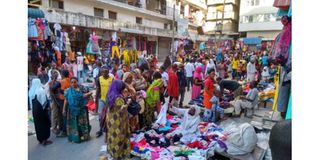Counterfeit crisis: Tanzania cracks down on fake goods amid mounting public risks

What you need to know:
- The impact is regional. A joint study by the Confederation of Tanzania Industries (CTI) and the Global Organised Crime Index ranked Tanzania and Kenya as the most affected by counterfeiting in the East African Community.
Dar es Salaam. Tanzanians are being urged to exercise greater caution when shopping, as counterfeit goods continue to flood local markets, posing serious threats to public health, safety, and the economy.
From fake medicines and cosmetics to substandard electronics and agricultural inputs, the problem has reached worrying levels.
Authorities warn that nearly half of the products circulating in the market may be counterfeit—a crisis with far-reaching consequences.
“This is no longer a petty issue,” said Head of the Fair Competition Commission (FCC)’s Anti-Counterfeit Surveillance and Control Department, Mr Salvator Chuwa.
“Counterfeit goods are destroying lives, reducing investor confidence, and costing the nation billions in lost revenue.”
The impact is regional. A joint study by the Confederation of Tanzania Industries (CTI) and the Global Organised Crime Index ranked Tanzania and Kenya as the most affected by counterfeiting in the East African Community.
The countries’ strategic location and porous borders have made them entry points for illicit goods.
“We estimate that between 15 and 25 percent of Tanzania’s domestic revenue is lost annually due to counterfeit trade,” said economist Dr Zuberi Makongo. “That’s a staggering $343 to $566 million in losses—enough to fund major healthcare or infrastructure projects.”
According to FCC, goods worth over Sh15 billion were seized in the 2022/2023 financial year alone. Meanwhile, the Tanzania Bureau of Standards (TBS) destroyed more than Sh1.5 billion worth of substandard goods in the second half of 2024.
Among the most dangerous categories is healthcare. The Tanzania Medicines and Medical Devices Authority (TMDA) estimates that around 30 percent of medicines in circulation are counterfeit.
These include common antibiotics like amoxicillin and co-trimoxazole, and anti-malarials such as quinine and artemether-lumefantrine.
“In 2023 alone, we seized fake medicines valued at over $20,000 in Katavi, Tabora, and Kigoma,” said a TMDA official. “These drugs are not only ineffective but also contribute to resistance and unnecessary deaths.”
Consumers are also falling prey to counterfeit electronics and personal care products. Faulty phones, exploding batteries, and unsafe cosmetics are common in informal markets.
“I bought a branded lotion in Kariakoo. My skin reacted badly within days—it turned out to be fake,” said Asha Ndugu, a Dar es Salaam resident. “It was cheaper than usual. Now I understand the risk.”
In response, the government is amending the Merchandise Marks Act of 1963 to tighten the legal grip on counterfeiters.
Speaking during the World Anti-Counterfeit Day commemorations in Dodoma on June 25, 2025, the Minister for Industry and Trade, Dr Selemani Jafo, said the changes will close long-standing legal loopholes.
“The FCC will be better equipped to implement the amended law and deal with the growing sophistication of counterfeit trade,” he said.
Minister Jafo emphasized that the original 1963 law is outdated and does not reflect today’s complex market dynamics.
“Serious investors want to operate in countries with strong regulatory systems. That’s why we are not only amending this Act but also working on changes to the Trademarks Act and accompanying regulations,” he explained.
The Merchandise Marks Act, along with the Fair Competition and Anti-Fraud Act of 2003, gives authorities the mandate to seize, detain, and dispose of counterfeit goods while prohibiting deceptive business practices.
Experts say strengthening the law is just one part of the solution. Legal scholar Dr Edda Mwamfupe argued that raising consumer awareness is equally important.
“We must empower Tanzanians to identify fake products before they buy them. Prevention is always cheaper than prosecution,” she said, calling for more education campaigns and digital verification systems to ensure product authenticity.
As Tanzania seeks to position itself in regional and global markets—including through the African Continental Free Trade Area (AfCFTA)—addressing the counterfeiting menace has become more urgent.
“Let’s not risk our trade credibility and investor confidence,” warned Minister Jafo. “The time to act is now.”





